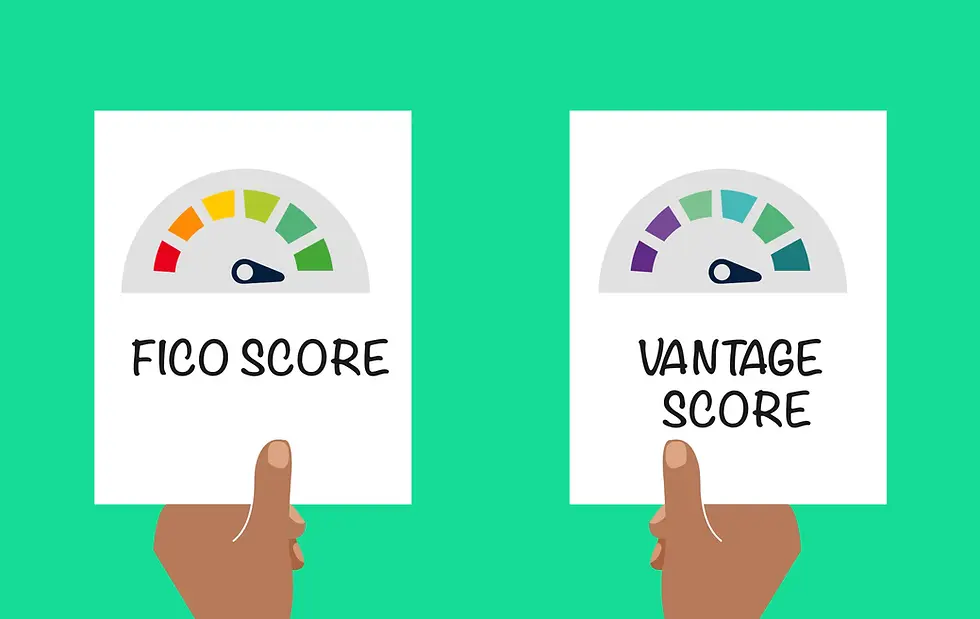Understanding the Key Differences Between FICO and VantageScore in 2026
- Guard My Credit

- Oct 9, 2025
- 4 min read
As we look ahead to 2026, knowing how credit scores can impact major financial decisions, like buying a home, is vital. The two main players in this field are FICO® and VantageScore®. These credit scoring models help lenders gauge a borrower's creditworthiness, but they work in different ways. In this post, we will break down the latest versions of each model—FICO 10 and VantageScore 3.0 & 4.0—and how they are applied in the mortgage industry.

What is FICO®?
FICO® (Fair Isaac Corporation) has been around since 1956 and is one of the most established credit scoring models. Its latest version, FICO 10, offers lenders a better understanding of consumer credit behavior.
FICO scores range from 300 to 850. A higher score means better credit. Factors that influence this score include:
Payment history (35% of the score)
Credit utilization (30% of the score)
Length of credit history (15% of the score)
Types of credit in use (10% of the score)
New credit inquiries (10% of the score)
Currently, about 90% of lenders use FICO scores, which shows its importance in the mortgage process. What is your FICO Score? Check it out now...
What is VantageScore®?
VantageScore® was developed in 2006 by Experian, TransUnion, and Equifax as an alternative to FICO. With its recent versions, VantageScore 3.0 and 4.0, it aims to refine how creditworthiness is assessed.
Like FICO, VantageScore also ranges from 300 to 850. However, it takes a different approach by focusing more on recent credit behavior. This can be particularly beneficial for those with limited credit histories. For example, someone who has recently made steady payments may qualify for a higher score compared to traditional models.
Although VantageScore is becoming more popular, it is still used by fewer lenders than FICO.

Key Differences Between FICO and VantageScore Scoring Models
FICO and VantageScore differ in their scoring models. FICO 10 uses updated data and algorithms that provide a detailed view of credit risk. On the other hand, VantageScore 3.0 and 4.0 emphasize recent behavior, which can lead to different scores for the same consumer based on recent happenings.
Data Utilization
FICO reviews a broad history of credit, while VantageScore focuses primarily on recent activity. For instance, if a person has a lengthy history of on-time payments but has recently missed one payment, this may negatively impact their FICO score more heavily than their VantageScore.
Industry Adoption
FICO scores dominate the mortgage industry, as nearly 90% of lenders rely on them for assessments. While VantageScore is gaining traction, particularly among alternative lenders and some fintech companies, it still has a smaller market share. This difference can influence a consumer's loan options depending on which score the lender prefers.
Score Ranges
Both scoring systems operate within a 300 to 850 range, but they interpret these scores differently. For example, a 700 score might be classified as "good" by FICO, while VantageScore could categorize it differently based on its unique metrics.

Mortgage Industry Usage
FICO 10 in the Mortgage Industry
FICO 10 integrates fresh data points, such as trended credit data, allowing lenders to analyze how a consumer’s credit behavior changes over time. This model is preferred by mortgage companies seeking a more precise assessment of risk, especially during uncertain economic conditions. This is crucial because a strong FICO score can increase the chances of getting approved for a mortgage, especially if the score is above 740, which usually secures better interest rates.
VantageScore 3.0 and 4.0 in the Mortgage Industry
VantageScore is emerging in the mortgage space but is mainly utilized by alternative lenders. These scores can benefit individuals with short or recent credit histories, such as recent college graduates or those who have just improved their credit scores. However, consumers should remember that not all mortgage lenders consider VantageScore, which could limit their options.
Which Score Should You Monitor?
For those planning to buy a home or apply for a mortgage, it is important to keep an eye on both FICO and VantageScore. Understanding how these scores work can help you make smarter credit decisions.
Checking Your FICO Score
Services like MyScoreIQ provide access to your FICO score, along with your credit report. This information allows you to keep track of your credit health over time and make adjustments as needed.
Checking Your VantageScore
To monitor your VantageScore, platforms like SmartCredit can help you understand your score and the factors that influence it. IdentityIQ offers similar services and adds identity protection features, ensuring you remain vigilant about your credit health.
Final Thoughts
Understanding the differences between FICO and VantageScore as we head into 2026 is essential for anyone considering a significant financial investment like a home. With the advancement of FICO 10 and the evolution of VantageScore, consumers need to stay informed about how these scores can affect their opportunities to receive loans.
By regularly checking both scores and understanding the elements that influence them, you can take active steps to enhance your credit health. This knowledge is a vital part of achieving financial success, whether you're planning to buy a home or simply want to maintain a good credit score.

Utilizing resources like Guard My Credit and Smart Credit can be beneficial in navigating credit scoring complexities effectively.






Comments